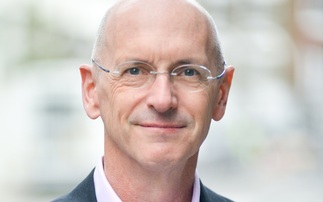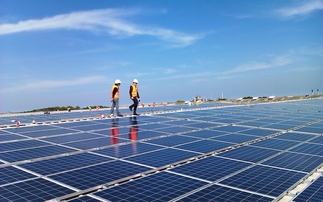The founder of Forum for the Future offers insights into a decade that saw the Sustainable Development Commission 'obliterated' and green business come to the fore
Sir Jonathan Porritt is founder director and trustee of sustainability non-profit Forum for the Future.
He helped set up the Forum in 1996 and has since seen it expand beyond the UK with offices in the US, India, and Singapore.
A leading environmentalist and writer of numerous books on sustainability issues, Porritt worked as director of Friends of the Earth from 1984-1991. He was later appointed by the Blair government to chair the Sustainable Development Commission for two terms between 2000 and 2009.
A former grammar school teacher, Jonathan also became chancellor of Keele University in 2012 and remains an active political campaigner for the Green Party and a number of other causes.
Where were you in 2007?
I was chairman of the Sustainable Development Commission at the same time as Forum for the Future was expanding internationally. The Forum had been going for seven years, and we had just got into this incredibly rich period of engagement with the Labour government doing this real joined-up, delivery-based approach to sustainable development across central government departments and local government. It was amazing. And I look at the government scene now and I think 'oh my God, that was a high point'.
In 2007, for instance, more than 90 per cent of local authorities in the UK had a local Agenda 21 action plan. They had a set of integrated indicators for economic, social and environmental outcomes, which were assessed on an annual basis by the National Audit Office, and regional bodies were really getting their heads around sustainable development.
It was an amazing time, because the government wasn't standing in the way of business - it was actually saying 'this is really important'. So everything we were doing in the Forum at that time and everything I was doing through my government role were completely congruent. They were very much marching hand in hand.
I can't help but compare that with where we are now, because there is nothing happening- literally nothing - from government on this front. It is a complete desert. The Coalition Government got rid of all the sustainable development architecture. It wasn't just that they got rid of the Commission itself, they also got rid of sustainable development ministers across government, stopped asking local government to do anything, botched all the regional bodies, and even stopped using the phrase 'sustainable development' completely because it was held to be irrelevant. In 10 years the entire memory of what sustainable development means as a central guiding principle in government has been obliterated. It's incredible to see.
What did business sustainability look like 10 years' ago?
Good. It was good. There were a few companies doing big-picture, joined up sustainable development, although it is also timely to remember how fragile, unfought, and naive some of it was - a lot of it was quite disconnected.
So I think one of the best things over the last 10 years is the degree to which business has upped its game. It has become much more integrated in its thinking, more sophisticated, better able to bring about real change on the ground and through supply chain management, relationships with business partners and consumers and so on. So 10 years' ago it wasn't bad, but it looks quite primitive in comparison to where we are now.
What has been the biggest barrier for companies improving their sustainability credentials?
There is a real barrier here. It is clear companies have to be able to demonstrate the 'business case' because if they can't do that, it is quite hard to actually justify to shareholders this is something that is absolutely in their interests.
Now some companies have made a better fist of that than others - Unilever, M&S and others have consistently said it is about long-term value creation rather than short-term business benefit today. But many companies have never really got heads around it and that's proving now to be quite problematic because the basic ground rules of our capitalist economy have really changed.
No one is suggesting the pursuit of economic growth indefinitely into the future on our finite planet is the closest thing we have to modern, species-wide insanity. You don't really hear anybody articulate that in modern politics. You do hear more of it - tempered and a little bit nuanced, obviously - in capital markets and amongst some of the savvier investment houses with people thinking about stranded assets and returns over time. But there's no mainstream challenge to that central premise for what progress for humankind looks like. Even in the most progressive companies, they are still hard up against a fundamentally, structurally unsustainable economy.
What's the most important thing you've learned in the past 10 years?
For us in the Forum there has been a really big set of lessons that we've had to internalise in the last four or five years. The first is that business is a hugely important and significant player in changing the circumstances out there and in improving the current state of play as it were, and you wouldn't have said that 10 years' ago, but now you can say that emphatically, and they are right there as a major agent of change in their own right.
But they have to operate within the ground rules and that means some of the interventions they make are not really as cost effective and outcome-effective as they could be, and there are quite severe limitations on what they can actually do. We have to think much more broadly about the systems in which those companies operate and how they can combine forces with other players to effect change at a systemic level. And that's not easy - systems engagement doesn't come naturally to a company that is used to very focused improvements in how it runs its own business and makes the margins it needs to make.
Also, when I think of the role of business in climate issues, particularly at the time of the Paris Summit and the agreement around the Sustainable Development Goals, business was very active in its advocacy work. They were a major influence, succeeding in bringing politicians with them.
So voice is very important, and nowhere is that more important these days than in the USA, where you have now got excruciating dilemmas for many large global companies which are having to work out what to do about a political system and a president that seems to want to reverse much of what they have done over the last 10 years. So that voice issue is crucial.
What do you think is the biggest misconception about green business and sustainable development?
There is still a misconception that 'sustainable development' equals 'environment', and there was a lot of pigeon holing under the Coalition government and since then under the Conservative government. They thought sustainable development was just another way of talking about the environment, and quite a lot of companies until recently used to look at sustainable development as a resource and environment issue, essentially.
I think I blame Mrs Brundtland [Gro Harlem, politician and former Prime Minister of Norway] for that. When the Brundtland Commission was doing its really influential, formative work back in the 1980s and produced the Our Common Future report in 1987, there was a moment, I'm told reliably, when they were thinking of calling it the 'Sustainable Economic Development Commission'. So right from the get go, that would have positioned it as a different way of doing economic development in the minds of wealth creators and politicians - doing it sustainably rather than unsustainably, which is what we have now.
And you can see how damaging that has been over many years - there are very few economists in the world today who really know their way around the sustainable development agenda. There are a few - and hats off to them - but it is a minority interest in the field of economics and amongst most university professors. University departments are still completely locked into conventional, neoliberal thinking about how economics work, and that deficit has cost us dear over a 20-year period.
What are the achievements - professional and personal - you are most proud of over the past 10 years?
Seeing the Forum develop an international presence has been incredibly rewarding. It was around 2007 that we said we had to find ways of diversifying outside our UK base. Most of our big companies are global, so the fact we are positioned in the UK is neither here nor there - in fact it may actually be a disadvantage. So starting with the US, then Singapore, then Mumbai, we have succeeded in establishing the Forum in important markets, which has taught us a lot about what sustainability means in other parts of the world. For me watching that development and all the differences that entails in terms of culture, understanding the role of business, entrepreneurs and innovators - it is just extraordinary to see that happening.
For me personally, the other third of my life has always been a pretty important balancing part of the deal for me. I spend a lot of time still involved in campaigning work - I'm still a member of the Green Party. I also do a lot of work with young people these days, looking at how we can improve political systems. For me it is important to keep that balance in sync between the work we do at a professional level through the Forum and my own personal political commitments.
What do you see as the biggest sustainability challenges for the next decade?
One of the biggest problems we've got at the moment is the debate about climate change has focused almost exclusively on energy, transport, materials, infrastructure - the man made, physical world that we depend on to create wealth. The land-based aspects of climate are much less understood and developed. If you think now about agriculture, forestry, land-use patterns and how we are going to optimise the use of different biomes for different purposes to feed people - to maintain biodiversity and maintain life support systems in soil and so on - we are massively off the pace.
In some respects land-based solutions are more important than the techy solutions. That is a huge challenge for the next decade, because politicians hardly know how to address that. All they can look at is the X numbers of mouths that have to be fed, so they default to a classic productivist fantasy - 'We're just going to have to increase productivity, regardless of impacts on water, soil, biodiversity, energy consumption, emissions' - it's madness.
Quite a lot of people also like to talk up the opportunities from Brexit and leaving the Common Agricultural Policy, but then I listen to Michael Gove and my heart sinks, so sorry about that.
I wrote this book about how good life is going to be in 2050, but I only wrote it from the point of view of 2050 because I know things are going to get worse before they get better. And they are going to get a lot worse. It is just inevitable. We haven't done enough - we haven't put in place enough of the alternatives and we are not good enough at articulating these different ways of understanding our relationship with the natural world. And that's as much our fault as anyone else's.
What do you think the green economy will look like in 10 years' time?
It is changing so fast. 10 years' ago there were lots of outright cynics saying the green economy was just window dressing and not even worth talking about as a sector in the way we categorise economic activities - it was just a bit of rhetoric for politicians to play around with.
10 years' on those cynics have completely disappeared, just by the virtue of the scale of market activity under different headings in the green economy. And if you project those growth curves forward, the green economy won't work as a concept in 10 years' time because it will be too bloody big. It will be so enormous that we'll have to rethink how you categorise different levels of economic activity. So I'm hugely hopeful about that, and what makes me particularly hopeful is that will get investors to re-calibrate their future value in earnings over time in terms of their own portfolios, and that means we should be seeing trillions of dollars of investment flowing into different aspects of the green economy during the next decade. It has to, as we know it's not moving fast enough right now.
What are your own career ambitions for the next decade?
Most of the stuff we do in the Forum that really gives us all a huge amount of hope for the future is the more radical, progressive stuff we do with our business partners, because if you can find that sweet spot which they know they need to address, the Forum can help them think about that in a way that doesn't threaten their current business model but opens up other possibilities. It is fantastic to see how the corporate energy that can be unleashed has the potential to change things very fast and that matters a lot to us.
Me personally, I still get a lot of sense of my hope for the future from working with young people, and finding opportunities for them to articulate the way they see the world more compellingly and to be more outspoken. One of the most interesting little projects we're involved with in the Forum is working with two of our partners Unilever and Marks & Spencer on an initiative called Collectively - which is bringing young employees together to think about what is going to happen to make our societies more socially just and inclusive. For me that is fantastic, because it is creating a caucus of really switched on radical thinking inside the companies, so they can see that this is where young people are beginning to shift in their own lives. We really need to do a lot more of that.
The last 10 years have been a pretty exciting time for me and I'm 67 now so I'm looking ahead to the next 10 years and imagining what I'll be doing in 2027. I imagine it will probably look quite different to what I'm doing now - I certainly won't be doing the same amount of stuff that I do for the Forum. I'll be doing much more around political and radical activism stuff, because I can see that becoming more important.
I'm also Chancellor of Keele University, so I'm very passionate about the world of education and how to create opportunities for young people to see the world differently, so I know that's going to become a bigger part of what I do over the next 10 years.
Jonathon Porritt will be speaking at the BusinessGreen Leaders' Summit on November 9th.
This interview is part of a series of Secrets of the Pioneers interviews, published in association with Greenhouse PR, to mark BusinessGreen's 10th anniversary. The full series, including interviews with Christiana Figueres, Lord Stuart Rose, and Lord Stern, will be published on the day of the Summit.
You can book your place at the summit here.









